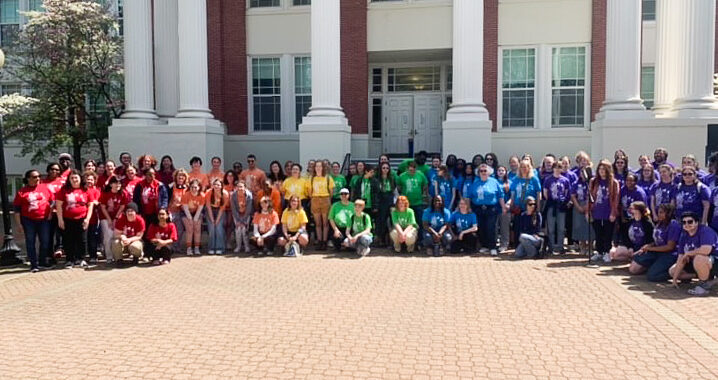Winter Leadership Symposium sparks valuable conversations concerning UMW
4 min read
Ali Myers | University of Mary Washington
By MIRANDA O’CONNOR
Staff Writer
On Saturday, January 20, the University of Mary Washington Leadership Winter Symposium took place on UMW’s campus in Dodd Auditorium. The Winter Symposium, put on by the Student Leadership Committee, was a mandatory program for all student organization leaders; and built upon the meaningful conversations that were held during the August Leadership Summit. The Symposium also provided supplementary tools to help make student organizations at UMW more successful through immersive training. During the event, there was an opportunity for student leaders to ask a panel of administrators questions about student life and policies.
Events such as the Fall Leadership Summit and the Winter Leadership Symposium ensure that leaders of student organizations are successful in leading their clubs, have a voice, and are heard by the administration. Hearing these responses to controversial topics from University President, Troy Paino, Inter-Club Association (ICA) President Katharine Barry, and student-leader, Karen Smith, provides the UMW community with positive support that the University of Mary Washington Administration is dedicated to making all organizations at UMW safe and welcoming for all.
Throughout the day, student organization leaders were able to submit questions, comments, or concerns to President Troy Paino, Dean Melissa Jones, and Dr. Juliette Landphair. As the day began to conclude, these topics were brought to panel. The most emergent topics that were discussed have been presented as controversial to some. These topics include the discussion of Greek Life in the UMW Community, multicultural equality, and Free Speech vs. Hate Speech.
The topic of Greek Life at the university was discussed, and in response, some administrators asked student leaders how many people do not want Greek Life on campus. What appeared to be a majority of the audience responded by raising their hand. One of the student leaders that attended was Senior Environmental Science major and Co-President of Club Volleyball, Karen Smith.
“I like that UMW does not have Greek Life because it allows students to be involved in several different clubs, rather than have to be committed to their sorority/fraternity,” said Smith. “I chose this school based on the absence of Greek Life because it allows me to spread my interests throughout many organizations.”
President Paino stressed that he and the university are willing to discuss the matter of Greek Life, but only if it is a student-initiated conversation.
Another topic of the symposium’s conversation was brought on by Student organization leaders who presented the idea of free speech vs. hate speech. Barry, stated that the main topic of this conversation was defining the line where free speech ends and hate speech begins.
While to most, hate speech is frowned-upon and derogatory, it is protected under the First Amendment. As a public university, UMW is required to abide by the United States Constitution, however, UMW is able to impose time, place and manner restrictions on speech. As hate speech could induce violence, safety of the UMW Community is the administration’s priority.
The last controversial subject touched upon at the symposium was the topic of cultural equality on Mary Washington’s campus. Members from multiple multicultural clubs raised concern about having a loud enough voice to advocate for equality at UMW.
“I am committed to ensuring that student voices are heard on campus and by the President,” President Troy Paino said. ”I recently appointed a Vice President for Equity and Access, Sabrina Johnson, to help us all understand what we must do to reach our goal of a diverse and inclusive learning community. All students and all groups should feel that their voice is valued and heard.”
In addition to the panel, this symposium presented students with focus groups, impactful dialogues, and also allowed the different organization leaders to have productive conversations with their peers. The Winter Symposium was a continuation of the Fall Leadership Summit, however the symposium only lasted one day, while the summit lasted for two. The Winter Symposium also offered student leaders a more flexible schedule. According to ICA President, Katharine Barry, student leaders were given more opportunity and choice of how they wanted to productively spend their day at the symposium.
While student organization leaders were required to be at the Winter Symposium, many activities were available to the students. During lunch, a resource fair was available for browsing. It was here where campus police were present, as well as Simpson Library staff, James Farmer Multicultural Center staff, among several others. The fair allowed students the opportunity to meet with staff from these different organizations, and present any opinions, questions, or concerns they may have. Resources to help with writing, editing, and maintaining club constitutions were also available to the student leaders.
A third part to this program will take place in April, which will provide training and guidance for newly-elected student leaders. According to Barry, who is a senior Environmental Science and Philosophy major, it is the hope that this three-part program will establish itself as an annual event for all student organization leaders, to help improve all student-run organizations at UMW.











